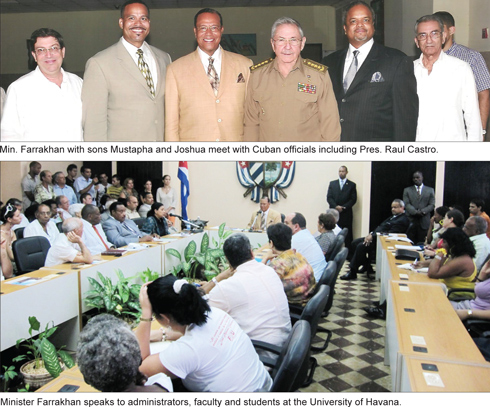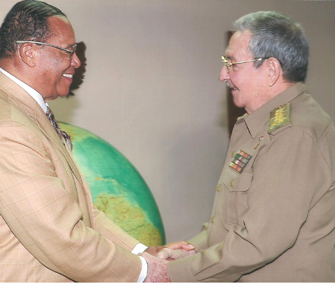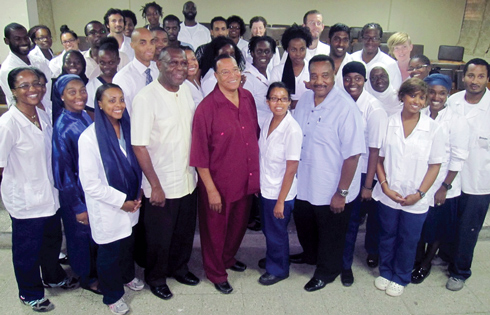
HAVANA, Cuba (FinalCall.com) – The Honorable Minister Louis Farrakhan, of the Nation of Islam, recently returned from an official trip to the Republic of Cuba where he addressed the government as well as the masses of people who had an opportunity to interact with him and hear his voice and message.
In the past the Muslim leader has made several trips to the small Caribbean nation of 11.5 million people that sits 90 miles South of the United States. But, without a doubt, this visit made the greatest impact in the way of strengthening people to people goodwill and solidarity.
Minister Farrakhan connected with the socialist society from top to bottom and had a nearly two hour audience with President Raul Castro, whom he met for the first time. The meeting was initially scheduled for only 20 minutes. President Castro is the younger brother of Fidel Castro, who led the Cuban Revolution that ousted the U.S., backed dictator and repressive ruler Fulgencio Batista in 1959.

“Comandante,” as the elder Castro is known, governed the Cuban people through some of its most trying times, including 52 years of resistance against a harsh imperialist embargo and blockade imposed by the U.S. government.
The Minister delivered a historical speech at the University of Havana, an institution that is 268-years old and where Fidel Castro pursued his education. The speech impacted both the students and faculty. The president of the university opened the program and a faculty member familiarized the audience with a detailed overview of Minister Farrakhan’s life and struggle as a helper of the Honorable Elijah Muhammad and outstanding fighter for Black communities in America and the world.
As an advocate for the rise of Black people the world over, Minister Farrakhan also raised the circumstances of the Afro-Cuban community with the government. The darker skinned populations in Cuba have been historically marginalized going back well before the pre-Revolution years.
The revolution of 1952—1959 declared that Cuba will be an egalitarian society and since racism was seen as a component of capitalism its eradication was expected with socialism. However Afro-Cubans are still for the most part absent in the highest levels of the government.
To Mr. Castro’s credit, he has encouraged more representation of Afro-Cubans in positions on the Central Committee, but racism is deeply embedded in the White Cuban ideology. Cubans are acutely aware of the nuances of color in their culture.
One of the most important meetings was at the Ministry of Religious Affairs, an important ministry in Cuba because most people in the outside world have the opinion that religion has no place in a communist government. The ministry was established under the leadership of Fidel Castro and includes a department for Islamic Affairs. According to the new deputy minister who oversees the department, there are approximately 5,000 Muslims in Cuba. The session was a major breakthrough for the small and growing Muslim community in Cuba.
Minister Farrakhan addressed an inter-faith session at the Martin Luther King Center, a church and school dedicated to the late civil rights icon. The meeting included leadership from different Christian denominations, Muslim leaders, Jewish leaders, Buddhist leaders and leaders of Santeria–the traditional African religion–as well.
The ecumenical meeting concluded with the laying of a wreath at the ashes of Reverend Lucius Walker, a Black American, whose organization Pastors for Peace defended the Cuban revolution and struggled against the unjust embargo. Reverend Walker traveled throughout America in caravans for peace, bringing much needed medicine and helping students from across America receive full-paid scholarships to Cuban Medical Schools in efforts to produce doctors for poor and disenfranchised communities.
Minister Farrakhan honored Rev. Walker describing him as a special type of man because of his commitment and dedication to this type of work. He said the reverend activist loved Cuba and was always ready to defend the principles of the Cuban revolution.

The Muslim leader and his 11-member delegation met with the director of the Latin American School of Medicine and addressed 50 students from the school–mostly from the U.S.–however there were also students from Ghana, Uganda, Tanzania, and Ethiopia and various countries across the Americas. The Minister spoke words of empowerment, encouraging students to develop a sense of determination to stay the course and exhorted them to be patient.
I know that at times it can be difficult, but think of the reward at the end, to become qualified as doctors who would return and serve your communities, he said.
Minister Farrakhan met with a highly motivated farmer who was involved in a new initiative for co-op farming. The farmer loves Cuba and what the land can produce. He was also pleasantly surprised at the Minister’s knowledge of farming, soil, pesticides and organic crops.
Min. Farrakhan met with the deputy director of foreign cooperation, a young, knowledgeable woman who spent 10 years at the Cuban Mission to the United Nations in New York. She was familiar with Louis Farrakhan and his work in America. She had seen him on television and heard his cds/dvds, but never had the opportunity to meet him. Her discussion was wide ranging and her in-depth knowledge of world affairs from her exposure at the United Nations was evident.
The Minister paid a courtesy call and held talks with Cuban Foreign Minister Bruno Rodriguez Parrilla on U.S.-Cuban relations and current political dynamics. There was a meeting with the Ministry of Solidarity that promotes unity with progressive movements across the world. A focus of the solidarity movement for the last decade has been to foster understanding and awareness around the plight of U.S. political prisoners called the Cuban Five.
Cuba sent the Cuban Five to Florida to observe Miami-based organizations suspected of perpetrating terrorist violence on foreign tourists in Cuba during the 1990s. The move followed a lack of effort from the U.S. government to investigate arrest and prosecute certain groups responsible and among active Cuban exiles. The Five were able to establish evidence implicating specific exile groups and individuals in the attacks but instead of arresting the alleged terrorists, the U.S. charged the Cuban Five.
Minister Farrakhan met with the mother of one of the five and heard from the son of another about efforts to free and see the Cuban Five.
The Cuban people have been engaged in a major campaign to bring attention to 14 years of suffering of these heroic patriots who left the comfort of their families, served their country and the security of the Cuban people.
The Minister visited a small music school in one of Central Havana’s historical buildings. The school has 280 students and is the place where he spent a few minutes playing the violin for students in 2006. He committed to help the students and made it possible for students to buy instruments to continue their study of music. The very talented young Cuban music students played for Minister Farrakhan.
While spending time with His Excellency, the president of Cuba, an international press corps waited over two hours for Minister Farrakhan who gave a very brief statement. The press conference closed out the historical trip to Cuba.
The Final Call is working on making some of the speeches of Minister Farrakhan in Cuba available to the people across America and throughout the world.
Related news:
- Raúl receives Louis Farrakhan (Gramma Internacional, 09-27-2012)
- Nation of Islam Leader Louis Farrakhan Met with Relatives of Cuban Five (Cuba News Agency, 09-19-2012)
- The Good Samaritan: A Study of Cuba (FCN, Minister Farrakhan, 03-27-2006)












